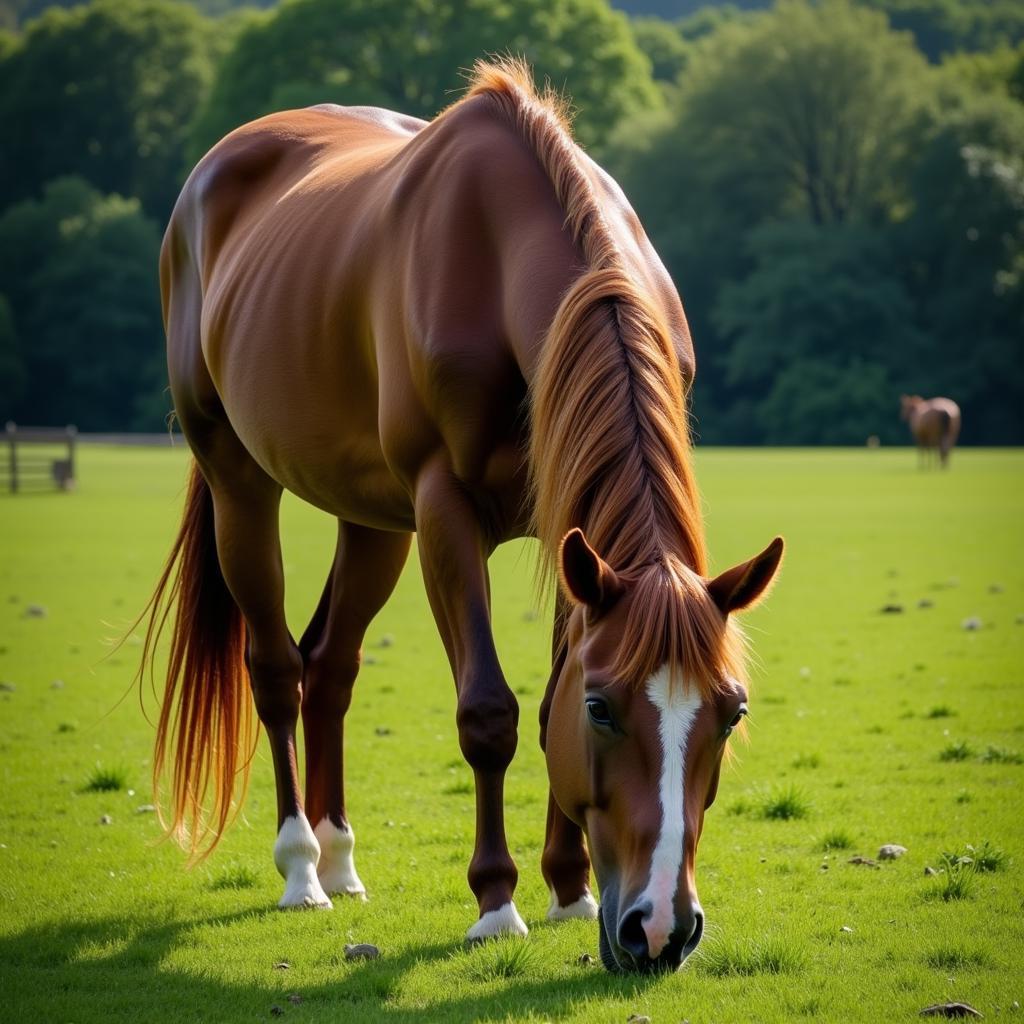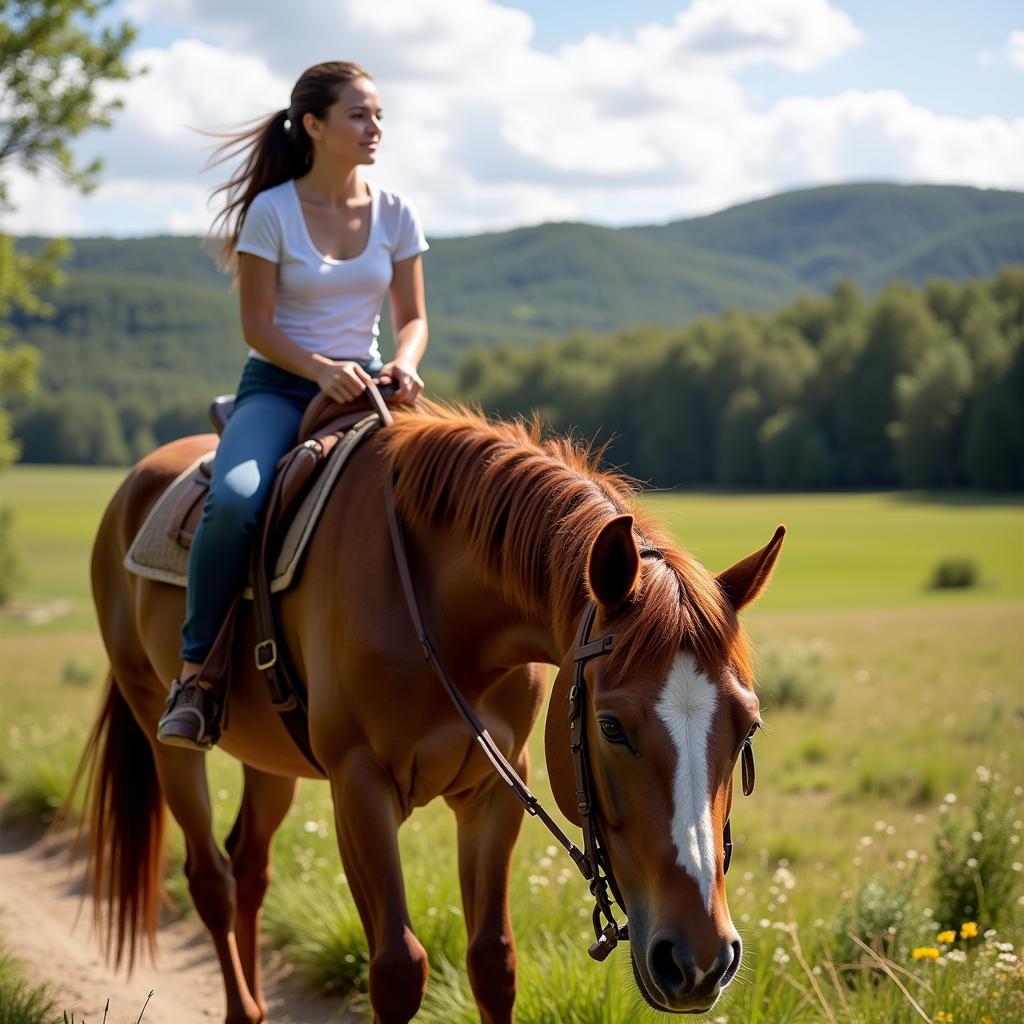A “One Eye Horse” is simply a horse that has lost sight in one of its eyes. Whether due to injury, illness, or a congenital condition, these horses can live full and active lives with the right care and understanding. While the thought of a horse navigating the world with only one eye might seem daunting, it’s important to remember that horses are incredibly adaptable animals.
Causes of Vision Loss in Horses
There are various reasons why a horse might lose sight in one eye. Some of the most common include:
- Trauma: Accidents involving sharp objects, blunt force, or penetrating injuries can damage the eye and lead to vision loss.
- Infections: Bacterial, viral, or fungal infections, such as equine recurrent uveitis (ERU), can cause inflammation and scarring within the eye, ultimately affecting vision.
- Equine Recurrent Uveitis (ERU): Often called “moon blindness,” this recurring inflammatory condition is a leading cause of blindness in horses.
- Cataracts: Similar to cataracts in humans, these cloudy areas in the lens of the eye can obstruct light and impair vision.
- Congenital Defects: Some horses are born with malformed eyes or underdeveloped vision, which may affect one or both eyes.
 One Eyed Horse Grazing Pasture
One Eyed Horse Grazing Pasture
Recognizing a One Eye Horse: Signs to Watch For
Identifying a horse with vision loss in one eye isn’t always obvious, especially if the horse has adapted well. However, some subtle signs can indicate potential vision problems:
- Head Tilting: The horse might tilt its head to favor the seeing eye.
- Hesitation or Spooking: The horse may hesitate when approaching unfamiliar objects or in new environments, especially on the side with limited vision.
- Cloudy or Discolored Eye: A change in the appearance of the eye, such as cloudiness, discoloration, or a change in pupil size, can indicate an issue.
- Discharge or Tearing: Excessive tearing, discharge from the eye, or swelling around the eye can be signs of infection or irritation.
Caring for a One Eye Horse: Special Considerations
Owning a one-eyed horse requires a few adjustments to ensure their safety and well-being:
- Safe Handling: Approach the horse from the side with good vision to avoid startling them. Always speak softly and let the horse know your location.
- Environmental Awareness: Be mindful of potential hazards in the horse’s environment, such as low-hanging branches, sharp corners, or uneven terrain, especially on their blind side.
- Riding Considerations: While many one-eyed horses can be ridden, it’s essential to assess their individual comfort level and adjust riding activities accordingly.
- Regular Veterinary Care: Routine eye exams are crucial for monitoring eye health, managing any existing conditions, and detecting any changes promptly.
Can You Ride a One Eye Horse?
The decision to ride a one-eyed horse is highly individual and depends on several factors, including:
- The Horse’s Temperament and Training: A calm, well-trained horse is more likely to adapt to riding with one eye.
- The Severity of Vision Loss: The extent of the vision loss and the horse’s ability to compensate will influence their riding suitability.
- The Riding Discipline: Some disciplines, such as trail riding, may be more suitable for one-eyed horses than others requiring precise movements.
It’s crucial to consult with an equine veterinarian and a qualified riding instructor to assess the horse’s individual capabilities and develop a safe riding plan.
Tips for Riding a Horse with One Eye
If you choose to ride a one-eyed horse, keep these tips in mind:
- Start Slowly: Begin with short rides in familiar, controlled environments.
- Clear Communication: Use clear and consistent aids to help the horse understand your cues.
- Build Confidence: Gradually introduce new challenges and environments as the horse becomes more comfortable.
- Be Observant: Pay close attention to the horse’s body language and be prepared to adjust your riding based on their responses.
Living a Full Life: One Eye Doesn’t Hold Them Back
With the right care and management, horses with one eye can lead happy, fulfilling lives. They can participate in various activities, form strong bonds with their owners, and enjoy their time grazing in the pasture. Remember, their vision impairment doesn’t define them.
 One Eyed Horse and Rider on Trail
One Eyed Horse and Rider on Trail
FAQs about One Eye Horses
Can a one-eyed horse live a normal lifespan?
Yes, a one-eyed horse can live a normal, healthy lifespan with proper care and management.
Do one-eyed horses require special feed or supplements?
No, their dietary needs are the same as any other horse. However, a balanced diet that supports overall health is essential.
Are one-eyed horses more prone to accidents or injuries?
They may be slightly more prone to accidents, especially in unfamiliar environments. However, with careful management and a safe environment, risks can be minimized.
Can one-eyed horses be turned out with other horses?
Yes, but it’s crucial to introduce them gradually and observe their interactions closely to ensure they integrate well.
Are one-eyed horses more challenging to train?
Not necessarily. They can learn and respond to training just like any other horse. Clear communication, patience, and positive reinforcement are key.
Need More Information?
For personalized advice or to discuss your one-eyed horse’s specific needs, please contact us. Our team at Justus Horses USA is dedicated to providing you with the support and resources you need to ensure your equine companion receives the best possible care.
Phone: 0772127271
Email: [email protected]
Address: QGM2+WX2, Vị Trung, Vị Thuỷ, Hậu Giang, Việt Nam
We’re available 24/7 to assist you with any questions or concerns you may have.